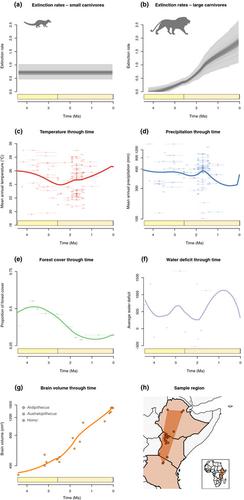当前位置:
X-MOL 学术
›
Ecol. Lett.
›
论文详情
Our official English website, www.x-mol.net, welcomes your
feedback! (Note: you will need to create a separate account there.)
Brain expansion in early hominins predicts carnivore extinctions in East Africa.
Ecology Letters ( IF 7.6 ) Pub Date : 2020-01-13 , DOI: 10.1111/ele.13451 Søren Faurby 1, 2 , Daniele Silvestro 1, 2, 3, 4 , Lars Werdelin 5 , Alexandre Antonelli 1, 2, 6
Ecology Letters ( IF 7.6 ) Pub Date : 2020-01-13 , DOI: 10.1111/ele.13451 Søren Faurby 1, 2 , Daniele Silvestro 1, 2, 3, 4 , Lars Werdelin 5 , Alexandre Antonelli 1, 2, 6
Affiliation

|
While the anthropogenic impact on ecosystems today is evident, it remains unclear if the detrimental effect of hominins on co-occurring biodiversity is a recent phenomenon or has also been the pattern for earlier hominin species. We test this using the East African carnivore fossil record. We analyse the diversity of carnivores over the last four million years and investigate whether any decline is related to an increase in hominin cognitive capacity, vegetation changes or climatic changes. We find that extinction rates in large carnivores correlate with increased hominin brain size and with vegetation changes, but not with precipitation or temperature changes. While temporal analyses cannot distinguish between the effects of vegetation changes and hominins, we show through spatial analyses of contemporary carnivores in Africa that only hominin causation is plausible. Our results suggest that substantial anthropogenic influence on biodiversity started millions of years earlier than currently assumed.
中文翻译:

早期人类激素的大脑扩张预示着东非食肉动物的灭绝。
尽管当今人类活动对生态系统的影响是显而易见的,但尚不清楚人参素对共生生物多样性的有害影响是最近的现象还是还是早期人参素物种的模式。我们使用东非肉食动物化石记录对此进行了测试。我们分析了过去四百万年中食肉动物的多样性,并调查了人类肉食动物的认知能力,植被变化或气候变化是否与下降有关。我们发现,大型食肉动物的灭绝率与人的人脑大小增加和植被变化有关,但与降水或温度变化无关。虽然时间分析无法区分植被变化和人为因素的影响,我们通过对非洲当代食肉动物的空间分析表明,只有人为原因是合理的。我们的结果表明,对人为生物多样性的重大人为影响比目前设想的早了数百万年。
更新日期:2020-01-14
中文翻译:

早期人类激素的大脑扩张预示着东非食肉动物的灭绝。
尽管当今人类活动对生态系统的影响是显而易见的,但尚不清楚人参素对共生生物多样性的有害影响是最近的现象还是还是早期人参素物种的模式。我们使用东非肉食动物化石记录对此进行了测试。我们分析了过去四百万年中食肉动物的多样性,并调查了人类肉食动物的认知能力,植被变化或气候变化是否与下降有关。我们发现,大型食肉动物的灭绝率与人的人脑大小增加和植被变化有关,但与降水或温度变化无关。虽然时间分析无法区分植被变化和人为因素的影响,我们通过对非洲当代食肉动物的空间分析表明,只有人为原因是合理的。我们的结果表明,对人为生物多样性的重大人为影响比目前设想的早了数百万年。











































 京公网安备 11010802027423号
京公网安备 11010802027423号